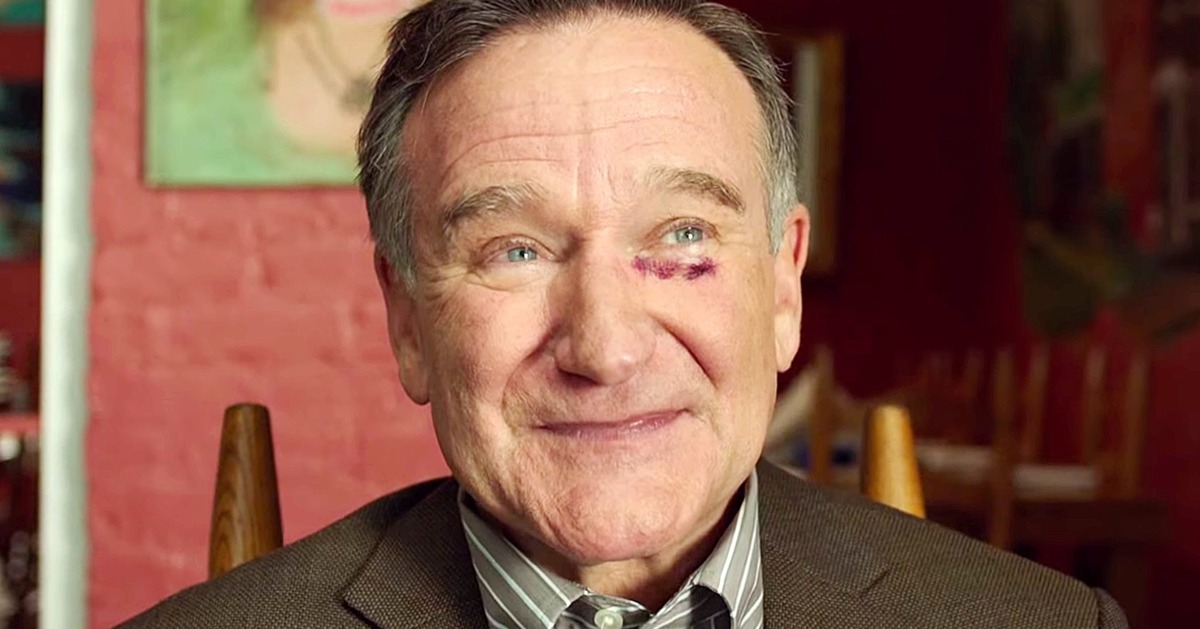
From timeless classics to joyful fluff, cinema is a wonderful way to achieve delight, escape, and exhilaration. The following list is for anyone who’s ever watched with delight the madcap tomfoolery of the Marx Brothers, or chuckled to themselves while in line at the grocery store recalling, say, Madeline Kahn’s hilarious crooning in Blazing Saddles (“I’m tired, sick and tired!”) or Will Ferrell’s bullying in Old School (“You’re my boy, Blue!”), and for those who’ve seen a picture just to enjoy Cary Grant’s furrowed brow or John Cleese’s ludicrous physicality, turn of phrase, and frenzied mental unraveling.
These are 20 of the funniest performers ever to grace the screen, and for cinephiles you’ll be sure to find many of your favorites, and perhaps a few you’re not all that familiar with or have been meaning to give another chance. Please add the names we’ve missed in the comment below, and above all, enjoy!
20. Catherine O’Hara

From her legendary run on Second City Television (1976–1984) to her head-spinningly hilarious turns on the silver screen in films such as After Hours (1985), Beetlejuice (1988), Home Alone (1990), The Nightmare Before Christmas (1993), Waiting for Guffman (1996), Best in Show (2000), and A Mighty Wind (2003), amongst others, few comediennes have enjoyed the longevity and sustain as Catherine O’Hara.
This Toronto-born, multi-Emmy Award winner (she’s also netted American Comedy and SAG awards amongst many others), is also the triple threat of actress, writer, and singer/songwriter (or is that quadruple threat?), is a genius celebrity impersonator, a gifted voice actor (her lengthy CV includes a wealth of animated films from longtime collaborator and friend Tim Burton to Studio Ghibli).
Her regular film and television appearances have endeared her to generations of fans, but for me her most ingenious comic work has sprung from her mockumentaries with Christopher Guest (her turn as Cookie “You don’t forget the best” Fleck in Best in Show is comic cubic zirconia).
19. Mel Brooks
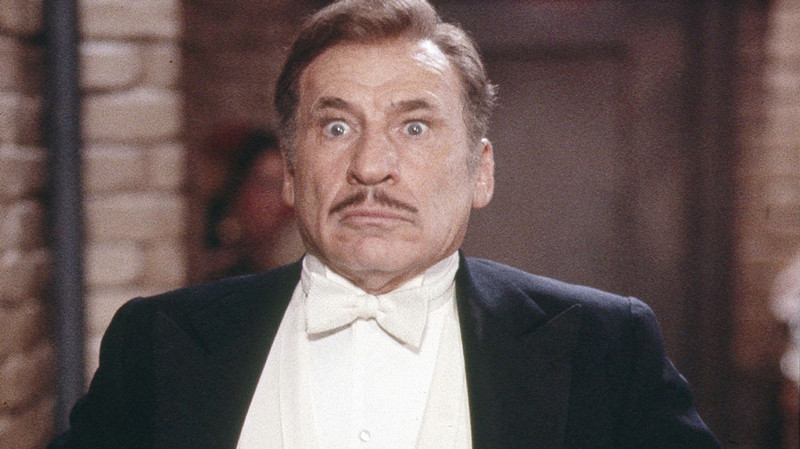
“I never knew a person could be that funny,” quipped Larry David, speaking at the American Film Institute’s tribute to Mel Brooks in 2013, adding, “working with Mel on [Curb Your Enthusiasm] was one of the great thrills of my life.”
A prolific and multi-talented artist and comic icon, Brooks has made a name for himself as an actor, comedian, composer, director, and producer, and is one of only a select few who has received an Oscar (Best Original Screenplay in 1968 for The Producers), an Emmy (his first one was in 1967 for Outstanding Writing Achievement in Variety for a Sid Caesar TV special, then he won three more in 1997, 1998, and 1999 for Outstanding Guest Actor in a Comedy Series for Mad About You), a Tony (of which he won three in 2001 for his work on his musical, The Producers), and a Grammy (two, in 2002, again for The Producers).
Known best for his comic parodies and farces, his career bloomed first in television, where he teamed with Carl Reiner, his collaborator for years, and also with Buck Henry, with whom he created the hit tv show Get Smart (1965 – 1970).
Amongst the eleben films which he’s directed (many of which he also wrote and co-starred in) include such classics as 1968’s The Producers (which he adapted into a Broadway musical that was a massive hit, running from 2001 to 2007), Blazing Saddles (1974), Young Frankenstein (1974), and Spaceballs (1987).
Brooks and his wonderful wife, the late Anne Bancroft, acted together in Silent Movie (1976) and To Be or Not to Be (1983), both of which rank amongst Brooks’ best big screen performances. Through his company, Brooksfilms, he’s produced a wide variety of films, including David Lynch’s The Elephant Man (1980), and David Cronenberg’s The Fly (1986), both being very crucial films for those directors, helping them reach international audiences that had previously eluded them.
One of those beloved funnymen who’ll do anything for a laugh, now in his nineties, and semi-retired (he still does a fair bit of voice over work), Brooks is still sharp as a tack, and as hilariously uncouth as a whoopie cushion.
18. Leslie Nielsen
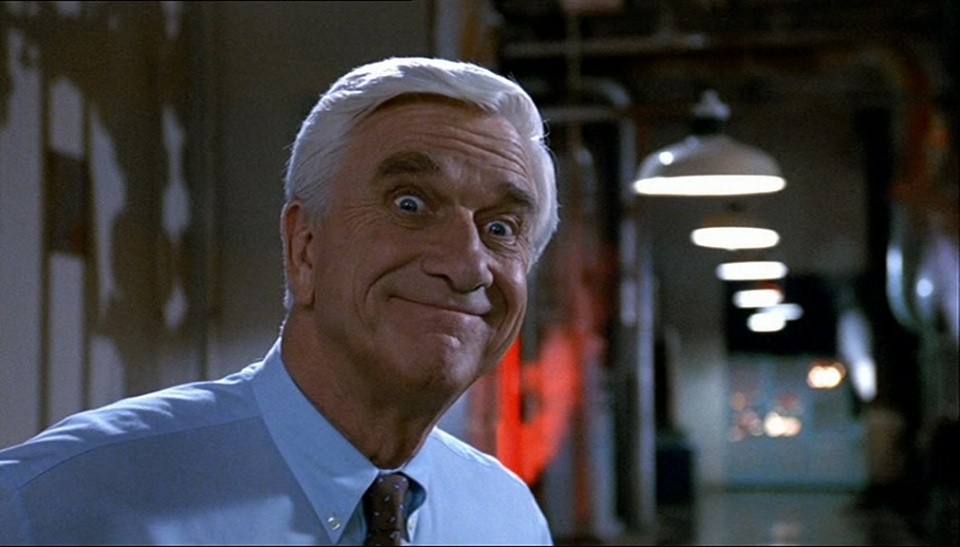
Ted Striker: “Surely you can’t be serious?” says Ted Striker (Robert Hays) to Dr. Rumack (Leslie Nielsen), who deadpans: “I am serious. And don’t call me Shirley.”
This brief exchange of essentially throwaway quipping, from the 1980 disaster film parody Airplane! has, over the years, entered the lexicon of classic comedy quotes and has also become one of Neilsen’s most recognizable roles.
A legendary Canadian actor, comedian, and producer, Nielsen’s acting career spanned over 50 years, beginning in the Golden Age of television where he toiled away in relative obscurity before landing the plumb role of Commander John J. Adams in the 1956 sci-fi classic The Forbidden Planet. From there Nielsen continued making movies and appearing in television (1972’s The Poseidon Adventure being perhaps his most popular at that point), but it really wasn’t until the aforementioned Airplane! in 1980 that his reinvention as a droll comedian with a brilliant knack for timing and execution established Nielsen as one of the great funnymen of film.
Deliberately casting him against type, the comedy filmmaking trio of Jim Abrahams and brothers David Zucker and Jerry Zucker had found their muse in Nielsen and soon began a regular collaboration with him. While short-lived and underappreciated during its initial run, the Zucker, Abrahams, and Zucker TV series Police Squad! (1982) was perfect for Nielsen, who played the show’s inept star, the bumbling Detective Frank Drebin. A spoof on police procedurals with slapstick aspirations, Nielsen would reprise the role of Drebin in the massively successful film The Naked Gun (1988), and its two well-received sequels The Naked Gun 2½: The Smell of Fear (1991) and Naked Gun 33⅓: The Final Insult (1994).
These films were such huge hits that they launched a late career renaissance for Nielsen, who played lead and supporting roles in endless comedies, often of a slapstick or spoof nature, making him what Roger Ebert described as “the [Laurence] Olivier of spoofs.”
17. Will Ferrell
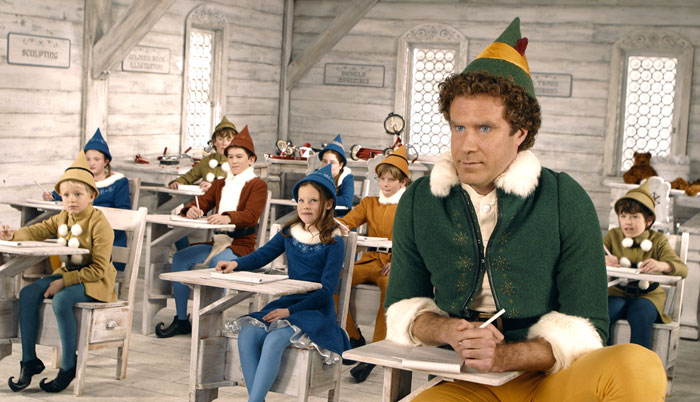
First starting out with the LA-based improv comedy group the Groundlings before rising to fame in the mid-90s as a standout performer on Saturday Night Live, John William Ferrell was one of the key comics dubbed the “Frat Pack” (a generation of comic actors who emerged from the late 90s and early 2000s that also included Jack Black, Steve Carell, and Ben Stiller amongst others), who made the move from television to hugely bankable comedies such as Old School (2003), the contemporary Christmas classic, Elf (2003), Anchorman: The Legend of Ron Burgundy (2004), Talladega Nights (2006), and Stranger Than Fiction (2006), amongst his most notable works.
Co-founder with comedy partner in crime Adam McKay, of the website Funny or Die (launched in 2007 and still going strong), Ferrell is a highly regarded entertainer with many accolades and awards to his name, one of the highest being a 2011 1 Mark Twain Prize for American Humor.
As a prolific actor, comedian, producer, and writer, Ferrell is very much a beloved and prolific star of stage and screen, who’s shown a mastery not just for side-splitting improvisation, but also of political satire, surreal humor, and physical comedy, too. And with so many quotable quips in all of his films, many feeling, whether accurate or not, ad-libbed, he may well be the new reigning king of the one-liners. To wit: ““I love scotch. Scotchy scotch scotch. Here it goes down, down into my belly.”
16. Bill Murray
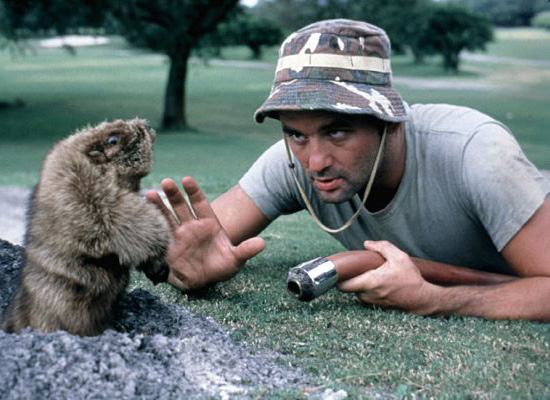
“Chicks dig me,” says former taxi driver, now army private John Winger (Bill Murray) in Ivan Reitman’s 1981 hit buddy comedy, Stripes. “Chicks dig me because I rarely wear underwear, and when I do, it’s usually something unusual.”
Stripes was the third consecutive comedy hit film for Murray, following his goofy and decidedly lowbrow antics in 1979’s Meatballs (also directed by Reitman), and 1980’s Caddyshack. Of course, and like so many other comic actors on this list, Murray had established a beachhead before making any films via first-rate exposure on Saturday Night Live (he starred on the show for three seasons from 1977 to 1980).
Other highlights in Murray’s cinematic career include Ghostbusters (1984), Quick Change (1980, which he also co-directed), What About Bob? (1991), Groundhog Day (1993) and then something of a career rejuvenation was sparked after a prominent role in Wes Anderson’s Rushmore (1998) which led to further acclaimed roles including The Royal Tenenbaums (2001), Lost in Translation (2003), the Life Aquatic (2004), Broken Flowers (2005), and the Grand Budapest Hotel (2014) amongst many others.
While over the years Murray did have a reputation as being a somewhat difficult challenge to reign in and work with, with story’s of onset feuding going back to his SNL days, he’s mellowed over the years and acquired a new reputation as an endearing man about town, much easier going (his many films with Anderson, Sofia Coppola, the Farrelly Brothers and Jim Jarmusch suggest as much also), and with the knack of combining stirring drama, straight-faced hoopla and self-effacing hilarity.
While Murray displays a genius for ironic detachment (as in the aforementioned Stripes or his much celebrated role as Dr. Peter Venkman in the Ghostbuster films), it also seems that, hard-wired into his DNA, and very much in the tradition of Buster Keaton (whom you will find near the top of this very list), Murray offers up a stony deadpan that conjures something of a spiritual state, one that’s very close to ecstasy and also the very epitome of cool. Tu es très cool Bill, tu es très cool.
15. Jim Carrey
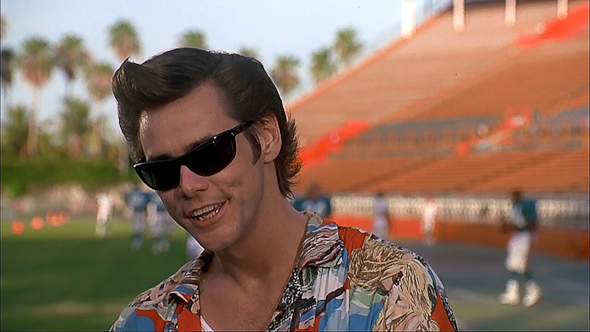
Rising to fame via his recurring role on the popular early 90s sketch comedy TV show In Living Color before leaping to box-office superstar status in 1994 with three smash hits all released within months of one another; Ace Ventura: Pet Detective, Dumb and Dumber, and The Mask. Canadian comic legend Jim Carrey, who actually spent years on the stand-up comedy circuit and in low budget comedy films before this “overnight sensation” became a household name.
While Carrey’s early successes were reliant on his energetic, exuberant, OTT physicality and irreverence, he later sought and succeeded with more subdued comedy in films like The Truman Show (1998), Man on the Moon (1999) and Eternal Sunshine of the Spotless Mind (2003). This about face, with more dramatic roles elbowing in to his career, brought about comparisons by audiences and critics to the likes of Cary Grant and Jimmy Stewart, prominent actors of yore who transitioned elegantly from comedies, to dramas, and back and forth, with aplomb.
In recent years, while still active in films, Carrey has largely eschewed the spotlight and done very little publicity for the film roles he does take, while simultaneously speaking candidly about mental health issues (particularly his own battles with depression), the importance of meditative states of mind, and other thoughtful, guru-like concepts. While this may read as rather flaky, or New Age-y, that discredits the sincere discourse Carrey engages in, while still making entertaining comedies like his 2014 sequel to Dumb and Dumber, and arthouse fare like The Bad Batch (2016) and True Crimes (2016). A committed artist and comedian, it’s hard not to like, or at least admire, what he’s done with his celebrity status and razor sharp comedical craft.